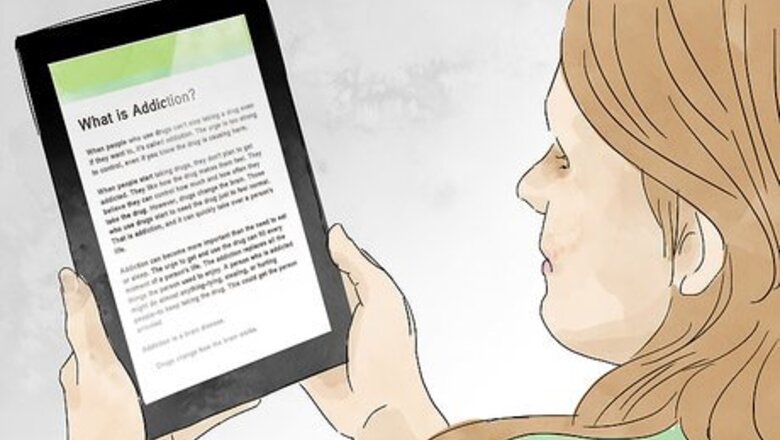
views
Making Decisions about the Confrontation

Learn about addiction. Oftentimes, addiction is the culprit if someone is stealing your medication. Your family member may have an addiction to prescription pain medication. If this is the case, spend some time learning about addiction. This will help you foster empathy and best address the situation. Read about addiction online. There are many resources you can use, such as Narcotics Anonymous, that provide information about what addiction is. Try to remember addiction is a medical condition and your family member cannot help being drawn to the substance. If you're currently seeing a therapist, you could try asking your therapist for more information about addiction and talk over confronting the family member with them. Remember, while addiction is one possible reason your family member took your medication, it is not the only explanation. A family member may also be stealing to sell the drugs for money. If you find your family member does not display symptoms of addiction, look for another explanation. You may even want to connect with a local rehabilitation center to talk with a drug counselor about your situation and get some advice about how best to proceed.

Have an idea of what you're going to say. You do not need to write out what you're going to say word for word. However, it can be helpful to have a rough idea of what you want to express going into the conversation. Jot down your feelings for a few minutes. Pull out a few phrases that best convey your feelings and concerns. You can have these in the back of your mind going into the conversation. You do not need to write down an entire script for yourself. In fact, doing so can make the conversation worse. You may sound disconnected when speaking to your family member, which is not something you want during a hard conversation.

Pick the right time and place. It's vital you talk to your family member at the right time. A poorly planned confrontation can give your family member a chance to evade or escape the conversation. As this is a sensitive subject, choose a place that's private. You can try confronting the family member when they're at your house, for example, or go to their place to talk. Make sure there are no external constraints. You do not want to begin the conversation only to have your family member run to work. Choose a time when they're not distracted and will be more receptive to your words.
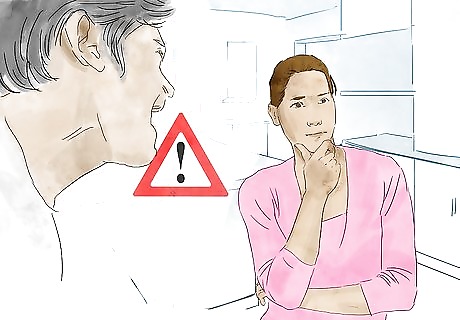
Release expectations prior to the conversation. You do not know how your family member will react. Trying to predict as much can affect how you approach the conversation. If you, for example, expect a bad reaction, you may come into the conversation angry or overly confrontational. Try to approach the conversation without any particular expectation about what will occur. Remember, no matter how well you know someone, you can never entirely predict their reactions. This is especially true with difficult issues. There is no way to predict the future or someone's behavior. Therefore, go into the conversation reminding yourself you do not know what is going to occur.
Confronting Your Family Member

Express love and concern. With addiction, you need to approach the topic from a place of love. You want your family member to feel supported, not alienated, by you. Ultimately, your goal should be to get them the help they need so they do not steal from you again. You are probably angry and hurt by your family member. It is okay to express this, as your family member needs to know their addiction hurts others. However, remember your family member likely feels guilt and shame on their own end. Come at it from a place of love. For example, do not say, "I'm furious that you took my medication." Instead, say something like, "I love and care about you. I'm angry you took my medication, but I'm also concerned by the behavior. I'm worried you have an addiction."

Avoid blame or guilt-tripping. Blame-oriented language can make the person feel guilty. While your family member should take responsibility for treating their addiction, a physical addiction itself is largely beyond someone's control. You do not want to say things that sound like you're blaming the person. This will only increase negative feelings and make your loved one less likely to seek help. It can be helpful to use "I"-statements here, as they are designed to reduce blame. They start with "I feel...", after which you immediately state your feelings. From there, you state the actions that led to those feelings, and explain why you feel the way you do. For example, "I feel hurt that you took my medication without asking because it's a huge betrayal of my trust."

State things in a calm and assertive fashion. Getting angry in these situations, no matter how emotionally taxing they are, will make things worse. Remember, you want to help your family member confront their addiction and get help. It's best to remain calm to achieve this. Addicts may try to confuse you or deflect blame. They may even deny wrongdoing at first. Be calm and continue to state your case. For example, your family member says, "Maybe you took more than you intended and didn't realize." Respond with something like, "Please do not lie to me. We need to talk this over."
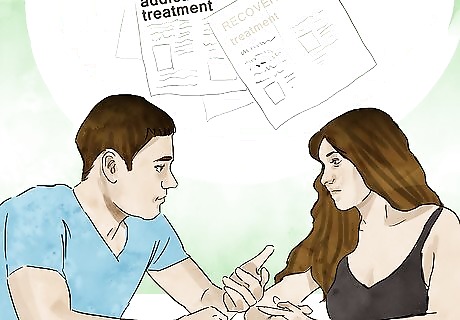
Offer to help them get treatment. You want to end the conversation on a note that allows you both to move forward. Talk to your family member about seeking treatment for addiction. This is vital if your family member has been stealing medication. End the conversation with something like, "I think we should get you treatment so this does not happen again. I love and care about you and I just don't want you getting hurt." Remember to keep your expectations in check. Your loved one might not be willing to make a change right away. They might need some time to think and want to return to the conversation later.
Moving Forward After the Confrontation

Seek help for your family member. The first step to moving forward is making sure your family member gets the treatment they need to overcome their addiction. Explore your options here. It's probably a good idea to enlist the help of other family members. There are many different options regarding treatment. Some treatments have patients stay in a facility, while other treatments only have out patient care. You can go to a local hospital or drug rehabilitation facility about possible treatment. The treatment you choose depends on the severity of the addiction and what you and your family can afford.
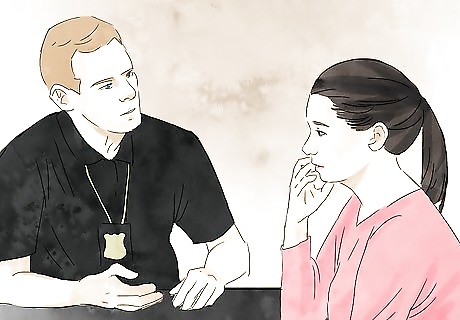
Get law enforcement involved under certain circumstances. Unfortunately, a confrontation may not always work. The problem may continue, despite your efforts to help, and in these scenarios you may need the help of law enforcement. If your family member starts to commit bigger crimes, such as picking up prescriptions for you or using your credit card to buy drugs, you should report them to the authorities. You do not want your credit and identity damaged by someone else. Also, if you feel like you, your loved one, or anyone else is in danger at any time, then do not hesitate to call emergency services or to call your local police. While it is always painful to get law enforcement involved with a loved one, this may be the wake up call your family member needs.

Cut ties from the family member if your health and well-being is threatened. You need your medication for your physical health and well-being. If your family member is continuing to take your medication after the confrontation, your health and safety is at risk. You should cut ties with the family member at this point. This can be painful, but you need to prioritize your health.
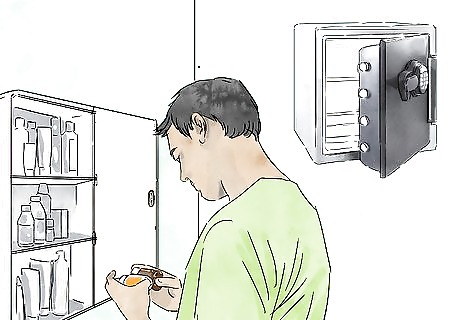
Keep your medication in a safe space. As you need your medication for health reasons, do your part to make sure it does not get stolen again. Find a safe and secure place to keep the medication away from the family member who stole it. Keep your medication somewhere with a lock that's difficult to reach. You could, for example, keep your medication in a safe over a cabinet. Just make sure the medication is accessible to you at all times. When choosing a secure spot for your medication, read the instruction labels that come with it. Some medication cannot be stored at certain temperatures, for example, or needs to be out of direct sunlight. You may also want to lock up any valuables that your loved one might try to sell for money to buy drugs.

Care for yourself. It's never easy to confront a family member about such a painful topic. In the aftermath of the confrontation, prioritize self-care. Do things to take your mind off the situation, like reading a book or watching a movie. Make time for any hobbies you enjoy. Spend time with kind and supportive friends and family members. Consider looking for a support group, like Al-Anon, to help you out.




















Comments
0 comment